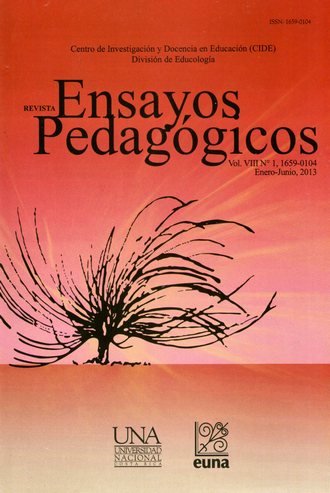Relevance of the Use of Video Conferences as a Teaching Resource in the Department of Philosophy at Universidad Estatal a Distancia, Costa Rica
DOI:
https://doi.org/10.15359/rep.8-1.7Keywords:
education, video conferencing, distance education, educational technology, phisolophyAbstract
This article aims to show the results of a research project carried out by the author in order to obtain his Master's Degree in University Teaching from “Universidad Nacional.” This study intended to know and assess the role of a highly relevant and pertinent audiovisual resource in distance education, namely, video conferencing in a particular academic space, Distance State University of Costa Rica (UNED, for its acronym in Spanish) in the Chair of Philosophy that belongs to the School of the Humanities.
References
Burbules (2012). Videoconferencias Dr Burbules: Aprender en todo momento y lugar (Parte 3-9). Recuperado de http://www.youtube.com/watch?v=ST1bc5B86Y4
Díaz, J et al. (1982). Estrategias de enseñanza aprendizaje: Orientaciones didácticas para la docencia universitaria. San José, costa Rica. IICA.
Mitra, S. (2012). Sugata Mitra: Los niños pueden aprender por símismos. Recuperado de http://www.youtube.com/watch?v=-u2LX-ZKs5I
Ruíz, S. (2009). Educación a distancia: Apuntes sobre sus orígenes y justiprecio como recurso práctico y poderoso para la educación permanente a la luz del cambio intrageneracional. Ensayos Pedagógicos: Umbral del Conocimiento, 71-86.
Salinas, J. et al. (2009). Tecnologías para la educación: Diseño, producción y evaluación de medios para la formación docente. Madrid, España: Alianza Editorial.
Torres, R. (2008). Los nuevos paradigmas en la actual revolución científica y tecnológica. San José, Costa Rica: EUNED.
Valverde, J. (I Semestre Setiembre, 2011). En Rev: UMBRAL. La tecnología en el proceso educativo de un posgrado del área educativa de la UNED. No XXVIII, 10-20.
Zelaya, J. (2007), Educación a Distancia: Una Alternativa para los Sistemas Educativos. San José, Costa Rica: Colección IDER.
Downloads
Published
How to Cite
Issue
Section
License
Ensayos Pedagógicos is subscribed to the Attribution-NonCommertial-NoDerivatives 4.0 International Creative Commons Licence, which allows both authors and readers to freely download, store, copy, and distribute the final approved publisehd version of the manuscript (post-print) as long as this is done without commercial purposes, no derivative works are generated, and the source and author are mentioned. As well, Ensayos Pedagógicos declares that authors will remain the rightful owners of the copyrights of their work in perpetuity.







